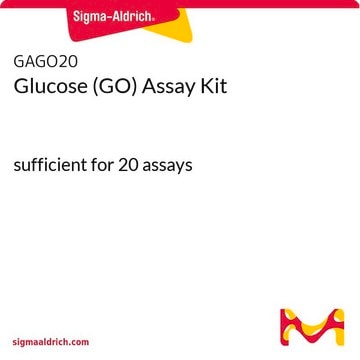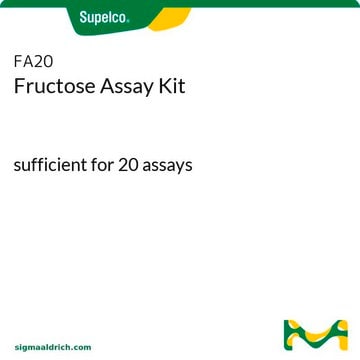G3293
Réactif de dosage du glucose
for use with enzymatic assay kits GAHK20, SCA20, FA20, SA20
About This Item
Produits recommandés
Classe(s) chimique(s) de l'analyte
sugars (glucose)
Technique(s)
photometry: suitable
Impuretés
≤0.005% Creatine phosphokinase, glutathione reductase, myokinase, NADH-oxidase,NADPH oxidase, phosphogluconic dehydrogenase, phosphoglucose isomerase, lactic dehydrogenase
<0.01% ATP-ase, myokinase
Application(s)
food and beverages
general analytical
Température de stockage
2-8°C
Spécificité
Application
Produit(s) apparenté(s)
Code de la classe de stockage
11 - Combustible Solids
Classe de danger pour l'eau (WGK)
WGK 3
Point d'éclair (°F)
Not applicable
Point d'éclair (°C)
Not applicable
Équipement de protection individuelle
Eyeshields, Gloves, multi-purpose combination respirator cartridge (US)
Certificats d'analyse (COA)
Recherchez un Certificats d'analyse (COA) en saisissant le numéro de lot du produit. Les numéros de lot figurent sur l'étiquette du produit après les mots "Lot" ou "Batch".
Déjà en possession de ce produit ?
Retrouvez la documentation relative aux produits que vous avez récemment achetés dans la Bibliothèque de documents.
Les clients ont également consulté
Protocoles
Enzymatic Assay of α-Glucosidase by the Modified Boehenger Procedure (EC 3.2.1.20)
To standardize an enzymatic assay procedure of cellulase.
This procedure may be used for the determination of Amyloglucosidase activity using starch as the substrate.
Notre équipe de scientifiques dispose d'une expérience dans tous les secteurs de la recherche, notamment en sciences de la vie, science des matériaux, synthèse chimique, chromatographie, analyse et dans de nombreux autres domaines..
Contacter notre Service technique






